AI for Video Conferencing
Updated: March 27, 2024
AI for Video Conferencing is a transformative technology that enhances the video conferencing experience for participants. These intelligent solutions leverage artificial intelligence and machine learning algorithms to optimize various aspects of video conferencing, such as video quality, background noise suppression, and automatic camera framing. AI-powered video conferencing platforms can automatically detect and focus on active speakers, ensuring a more engaging and dynamic meeting experience. Additionally, AI can transcribe and translate conversations in real-time, facilitating seamless communication between participants who speak different languages. Some AI for Video Conferencing solutions can even analyze facial expressions and body language to gauge participant engagement and sentiment during meetings. By harnessing the power of AI, video conferencing becomes more efficient, inclusive, and productive, enabling organizations to overcome geographical barriers and foster collaboration among remote teams, ultimately leading to more effective and meaningful virtual interactions.
See also: Top 10 Videoconferencing software
See also: Top 10 Videoconferencing software
2024. Zoom unveils all-in-one AI work platform for more than just video conferencing
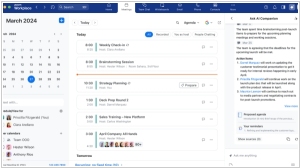
The unveiling of Zoom Workplace by a leading video conferencing company introduces an innovative "AI-powered collaborative platform" integrating its AI virtual assistant alongside a suite of novel features aimed at enhancing team productivity. Leveraging its existing AI Companion, Zoom Workplace streamlines meeting organization and summarization tasks, empowering users with its Ask AI Companion function to effectively prepare for and review meetings by aggregating and analyzing data from various Zoom applications such as Meetings, Mail, Team Chat, Notes, and Docs. Notably, the platform seamlessly integrates with third-party applications like Microsoft 365 and Google Workspace, further broadening its functionality and utility for users.
2023. Zoom partners with Anthropic to bring Claude chatbot to Zoom products
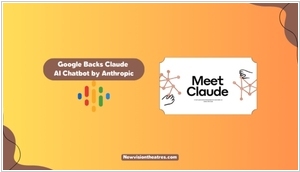
With the increasing prominence of generative AI, Zoom has recognized the importance of partnering with Language Model (LLM) companies to navigate the evolving AI landscape. In line with this strategy, Zoom has recently announced its collaboration with Anthropic, a partnership that will involve leveraging Anthropic's Claude chatbot on the Zoom platform, initially focusing on the Zoom Contact Center. The objective of this partnership is to enhance customer support by providing more accurate responses while minimizing instances where the models generate fictional answers in the absence of the correct response. Zoom plans to continue collaborating with the Anthropic model and gain a deeper understanding of its workings. Eventually, the intention is to incorporate this technology into other Zoom products. It is important to note that there is currently no specific timeline for the introduction of Anthropic-based functionality to the market. However, Zoom remains committed to ongoing development in this area.
2023. Zoom announces AI features that act as your personal assistant
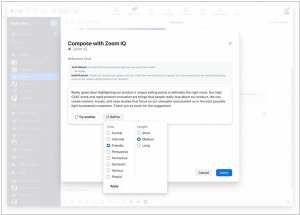
Video conferencing provider Zoom announced new additions to its AI-powered tool Zoom IQ. The new features leverage OpenAI's Large Language Model, or LLM, to summarize meetings, generate recaps, and draft chat and email responses. On the heels of announcements from Microsoft, Google, and Slack, Zoom is the latest major productivity tool to get the AI treatment. Zoom IQ already uses AI to give users meeting information through chapters, highlights from recordings, and action items. But it is taking it a step further by integrating OpenAI's powerful generative AI model. If you're late to a meeting, Zoom IQ can summarize in real time what you've missed and ask questions for you. Using text prompts, it can generate brainstorms using Zoom's whiteboard tool.
2023. Zoom is adding new features to compete with Slack, Calendly, Google and Microsoft
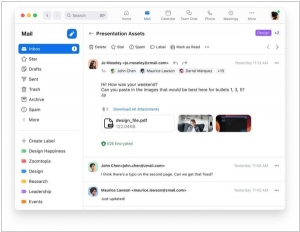
Zoom is expanding its offerings to compete with a range of companies, including Slack, Calendly, Google, and Microsoft, by introducing new features such as AI-powered meeting summaries, prompt-based email responses, and whiteboard generation, in addition to video "Huddles" and a meeting scheduler. Zoom aims to encourage users to shift more of their work tasks to its platform, and as such, it is making its email and calendar clients available to everyone. The company had been testing these tools since last year as part of a broader push beyond meetings. Furthermore, Zoom is offering hosted email and calendar services with end-to-end encryption protection and custom domains for paid users, which could serve as an alternative to Microsoft Exchange and Google Workspace for businesses.
2022. Google Meet gets automatic meeting transcriptions
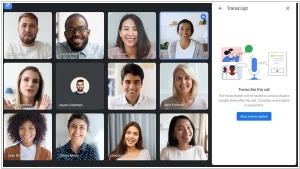
Google has introduced automatic meeting transcriptions as a built-in feature for its video conferencing service, Meet. Previously, users had to rely on third-party services like Otter to record and transcribe their calls. This new functionality is currently available for meetings conducted in English, with support for French, German, Spanish, and Portuguese slated for release in 2023. It's worth noting that Microsoft Teams already introduced a similar feature for English meetings over a year ago. Although Google possesses expertise in speech-to-text services through products like Assistant and the Android Recorder app, the addition of this feature to Meet has been a long-awaited development. Nevertheless, it is a welcome addition to enhance the meeting experience within Meet.
2022. AI-powered videoconferencing platform Headroom raises $9M
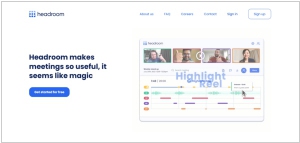
Headroom, a startup that focuses on developing AI-powered software to ostensibly enhance meeting efficiency, has successfully raised $9M. Headroom leverages AI to provide various features, including automatic transcripts and meeting summaries, which remain searchable after meetings through filters for attendees, notes, and topics. The platform allows for complete meeting replays and generates highlight reels with key moments and action items using AI-powered upscaling. Additionally, participants can utilize quick reactions like "thumbs up" and "wave" during meetings. One of Headroom's distinguishing features is its comprehensive analytics capabilities. The application aims to quantify "real-time meeting energy" by analyzing video, audio, and text from participants. It even tracks eye movements, hand gestures, and head poses to discern the sentiment expressed during exchanges.
2022. Otter.ai challenger Airgram raises $10M to transcribe and time your video calls
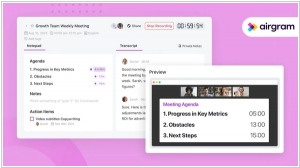
There is a multitude of tools available that compete in the market, aiming to facilitate smoother video calls for individuals. Some of these tools, such as the voice transcription service Otter.ai, have experienced a surge in demand during the COVID-19 pandemic and have attracted substantial investments. Now, an innovative newcomer named Airgram has entered the competition. In addition to transcribing Zoom, Google Meet, and Microsoft Teams calls into shareable and editable text, Airgram also aims to assist users in maintaining efficient meetings. It allows users to project their meeting agenda onto the screen and provides a timer to remind them not to exceed the allotted time.
2022. Zoom launches AI-powered features aimed at sales teams
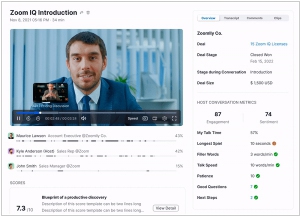
Zoom has unveiled Zoom IQ for Sales, a new offering that utilizes AI to analyze sales meetings and deals, providing valuable insights for sales teams. This marks Zoom's entry into the realm of sales automation software. Zoom's venture into this space is a natural progression of its ongoing investments in AI technology. Previously, the company introduced an AI-powered feature that highlights key moments from recorded meetings by automatically selecting the most relevant segments based on audio transcriptions. Additionally, Zoom recently acquired Kites, a startup focused on real-time translation and transcription, further bolstering its AI capabilities. The introduction of Zoom IQ for Sales demonstrates the company's commitment to leveraging AI to enhance sales processes and improve overall sales effectiveness.
2020. CommonGround raises $19M to rethink online communication

CommonGround, an innovative startup specializing in the advancement of "4D collaboration," has recently secured $19 million in funding. The company's objective is to develop online collaboration software that effectively captures the intricacies of in-person communication while also enhancing certain aspects of face-to-face conversations, hence the term "4D." By leveraging technologies such as computer vision and graphics, CommonGround aims to transcend traditional video-based interactions and offer a collaborative experience that goes beyond mere video conferencing.
2020. Huddl.ai wants to bring more intelligence to online meetings
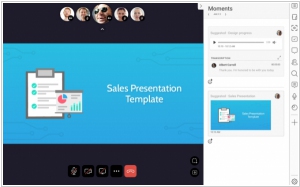
Huddl.ai is an innovative startup aiming to incorporate artificial intelligence into online meeting technology. By leveraging AI tools, Huddl.ai transcribes meetings, extracts important points, and assists users in comprehending the essence of lengthy sessions without the need to extensively review notes. Unlike existing solutions such as Zoom, Cisco WebEx, Google Meet, and Microsoft Teams, which merely provide a link to a cloud room for participants to join, Huddl.ai seeks to introduce a more organized approach to the entire meeting process.
2018. GoToMeeting added AI transcription, Amazon Alexa integration
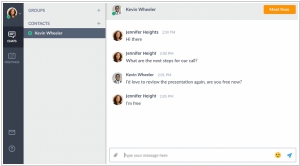
LogMeIn has recently implemented updates to its GoToMeeting video and audio conference platform, introducing several new features. These enhancements encompass a text chat function, an AI transcription service, and integration with Amazon's voice assistant, Alexa. The Business Messaging feature facilitates one-to-one or group chats among employees and external clients through the GoToMeeting desktop application or a standalone mobile app. With just a single click, users can seamlessly transition from a message thread to a video or audio conference. Additionally, the Smart Meeting Assistant transcribes meeting audio and securely stores the text in the cloud, enabling easy sharing afterwards. This advancement eliminates the need for attendees to worry about note-taking and allows them to concentrate fully on engaging in discussions with colleagues.

